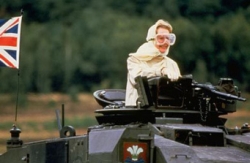 One of the more noisome phrases in the air today is ‘one should not speak ill of the dead’. The sentiment, both spoken and unspoken, is everywhere, and the dead we should not speak ill of is of course Mrs Hacksaw, the Iron Lady who famously decreed and then ensured ‘there is no such thing as society’. But we shall not speak ill of the dead. Labour leaders stand as pupils before Miss Jean Brodie, the better not to speak ill of the dead. In the Today coven, Humph and Jimbo cackle away at each other, reminiscing about conviction politicians. No, we shall not speak ill of the dead, oh no. April is the cruellest month. Mistress Thatch – she dead! wail the hollow men, heads filled with deathiquette. De mortuis nihil nisi bonum. And yet, between the desire and the spasm, between the potency and the existence, between the essence and the descent, falls the shadow. But we shall not speak of the shadow, oh no: de mortuis nihil nisi bonum.
One of the more noisome phrases in the air today is ‘one should not speak ill of the dead’. The sentiment, both spoken and unspoken, is everywhere, and the dead we should not speak ill of is of course Mrs Hacksaw, the Iron Lady who famously decreed and then ensured ‘there is no such thing as society’. But we shall not speak ill of the dead. Labour leaders stand as pupils before Miss Jean Brodie, the better not to speak ill of the dead. In the Today coven, Humph and Jimbo cackle away at each other, reminiscing about conviction politicians. No, we shall not speak ill of the dead, oh no. April is the cruellest month. Mistress Thatch – she dead! wail the hollow men, heads filled with deathiquette. De mortuis nihil nisi bonum. And yet, between the desire and the spasm, between the potency and the existence, between the essence and the descent, falls the shadow. But we shall not speak of the shadow, oh no: de mortuis nihil nisi bonum.
Yet much of what the Iron Lady left behind is a wasteland. For every new home owner, there are others whose lives have been rent hollow. For every new share owner, there are others whose lives have been stuffed. Hers indeed was the Kingdom, as she shattered – a process Dr No agrees was necessary – the behemoths of post-war Britain, but the lady so accomplished with the iron wrecking ball was not so skilled with the master builder’s square and compass. On the wasteland there grew not the foundations of a new Jerusalem, but bitter tall weeds, weeds whose long dark shadows still darken our days. Most of the ills we face today, from dysfunctional welfare, through cavalier banking, to a health service transformed into a comedy market played like a game of Monopoly, have their roots in the Thatcher years.
And yet, by deathiquette, we shall not speak ill of the dead. De mortuis nihil nisi bonum. But Dr No has no truck with such hokum! The Lady with the Tank was and is as far removed from the phoney protection of mawkish deathiquette as the dark side of the moon is from the sun, because she was, and still is, the public iconic and defining force of the ism that bears her name, an ism that scarred as much as it cured, that cast as many long shadows as it cast shafts of light into dark corners. Today, just as much as in the days when she was in power, we need to debate the consequences of Thatcherism, and that means we cannot allow the niceties of deathiquette to silence that debate, whatever that debate may entail.
Ah, but what about respect for the surviving family? Now, as it so happens, She Who Would Not Be Defeated famously paraphrased St Francis of Assisi as she entered Downing Street for the first time. While there are those who will say that, given what she was about to unleash, she said all the right words, but not necessarily in the right order, it also so happens that the hymnal version of the prayer was sung at Dr No’s mother’s Thanksgiving Service. Indeed, Dr No’s mother died exactly two months to the day before Lady Thatcher died, so he is no stranger to the recent contemplation of deathiquette. Did he seek to silence honest appraisal of his mother through the exercise of deathiquette? Of course not! She had her faults, but more to the point, her shoulders were broad enough to carry them. So, even on the day she died, we talked of faults as well as virtues, and saw her not through the blinkers of deathiquette, but as the whole and remarkable person she was, and we loved. Somehow, Dr No does not think she would have wanted it any other way. Nor, surely, could Lady Thatcher have wanted it any other way, for did she not herself say, in her paraphrase of St Francis, ‘Where there is error, may we bring truth’? So, for everyone’s sake and hers, let’s cut the crap, ditch the deathiquette, and talk the truth.
